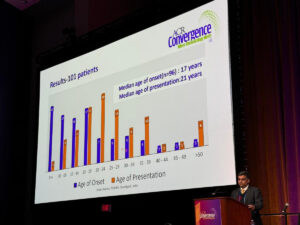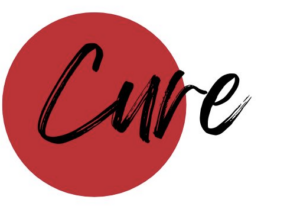February 2025: Resilience, Research, and Rare Disease Advocacy


Dear DADA2 Community:
As we approach Rare Disease Day 2025, I find myself reflecting on how far we’ve come. It was just 11 years ago this month that DADA2 was officially recognized as a rare disease. While we are all too familiar with the challenges faced by rare disease families, Rare Disease Day is also a time to acknowledge the strength, progress, and sense of community that have emerged from our shared journeys. To borrow the words of a new member of our community, visual artist Ellie Pritts, these past 11 years have truly been “a journey of adaptation and resilience.”
In this issue, we highlight new research, personal stories, and critical conversations around mental health. We share an update from the rapidly growing Indian cohort, where increased awareness and improved diagnostics are bringing more patients into the fold. Ellie Pritts’ inspiring story showcases how she has embraced Artificial Intelligence as a creative tool to overcome the physical challenges of DADA2. And for parents raising teens with rare diseases, we feature an insightful webinar from the National Organization for Rare Disorders (NORD) on supporting mental health during adolescence.
Each of these stories is a testament to our collective mission: to foster awareness, advocate for change, and support one another. We invite you to read, reflect, and share—because together, we make a difference.
With gratitude,

Chip Chambers, M.D.
Founder & President, DADA2 Foundation
 Updates on the Indian Cohort
Updates on the Indian Cohort

At the American College of Rheumatology (ACR) annual meeting last November, Dr. Aman Sharma, PGIMER, Chandigarh, India, presented the latest research out of the Indian cohort, perhaps the largest cohort globally. Over 40 physicians and researchers from around India participated in the study. The study, which analyzed data from 101 patients, underscores the importance of collaboration in advancing our understanding of this condition.
One key takeaway is the increasing number of diagnosed cases in India, where improved access to diagnostic testing and growing awareness—bolstered by presentations by Dr. Sharma and others at national and specialty-specific conferences—have led to more patients being identified. Notably, in this cohort 52 patients had CNS involvement including 35 patients with stroke, and 20 patients had ocular involvement. Recognizing this trend, Dr. Sharma spoke about DADA2 in his talk on ‘Vasculitis and Neuro-Ophthalmology’ during the recent Annual Conference of Neuro-Ophthalmology 2025.
The study also shed light on mortality risks, highlighting that while strokes and neurological complications were known contributors, severe gastrointestinal involvement emerged as a major cause of death, accounting for 8 out of 11 disease-related fatalities. The findings also emphasized the critical need for mental health support, with at least one patient tragically lost to suicide.
Additionally, researchers identified key predictors of mortality, including central nervous system (CNS) involvement, gastrointestinal complications, and the absence of anti-TNF treatment. Notably, the study documented cases of late-onset DADA2, with some patients presenting symptoms well into their 50s, further expanding our understanding of the disease’s spectrum.
This research reinforces the need for continued collaboration, increased awareness, and multidisciplinary care to improve patient outcomes.
Additionally, a recent Indian Supreme Court ruling will make it easier for DADA2 patients without any treatment support to receive care. The ruling sets up a standard protocol for rare disease patients to seek care at designated Centers of Excellence. Read more about it here.
 Mental Health and Teens with Rare Disease
Mental Health and Teens with Rare Disease
As Rare Disease Day 2025 approaches, we recognize the unique emotional and practical challenges that families face when navigating life with a rare disease. When we asked patients and caregivers what resources they need most, mental health support was one of the top requests.
To help address this need, the National Organization for Rare Disorders (NORD) hosted a powerful webinar featuring Rebecca Alexander—author, psychotherapist, and advocate.
In this session, she shares expert insights on managing stress, building resilience, and creating a supportive environment for both you and your teen.
Watch the webinar and gain valuable tools to help you navigate this journey with strength and confidence.
A Journey of Adaptation and Resilience
 “We don’t know what’s wrong with you, but you’re young. Go out and live your life. It’s probably not going to get worse.”
“We don’t know what’s wrong with you, but you’re young. Go out and live your life. It’s probably not going to get worse.”
When visual artist Ellie Pritts heard those words from yet another neurologist, she felt devastated. Deep down, she knew things were getting worse. For years, she had endured transient ischemic attacks (TIAs), which seemed to be occurring more frequently and with increasingly severe consequences. The most recent one had left her unable to walk for months.
Trusting her instincts, honed by years of unexplained symptoms, Ellie requested a referral to a rheumatologist. Within a week of her first appointment, she finally had an answer: a mutation on one of her ADA2 genes. “My case is pretty atypical because I’m older. I’m not a child, and I have a heterozygous mutation. I’m a symptomatic carrier, which isn’t very common either.”
Her diagnosis led her to the DADA2 Foundation, where she joined the private DADA2 Friends and Family Facebook group. Shortly after introducing herself, Ellie realized she wasn’t alone—four other members shared similar experiences of being symptomatic carriers.
Despite her long and difficult diagnostic journey, Ellie’s passion for art remained unwavering. “My art has not only kept me sane but has also kept me happy. Everything I’ve been through has crystallized my sense of purpose as an artist.”
As her condition progressed, neuropathy made it challenging to create in traditional ways, prompting Ellie to explore new artistic mediums, including Artificial Intelligence (AI). “It’s been a journey of adaptation and resilience. Creative technology has allowed me to augment abilities I’ve lost, filling in the gaps—or even introducing something entirely new that I might never have considered if I wasn’t forced to think outside the box.”
As Ellie’s artistic journey evolved, so did her career. With growing success, she now hopes to use her platform to raise awareness about DADA2. “I know this might not affect a huge number of people, but if something I create helps even one person like me receive a diagnosis sooner, it will be worth it.”
 You can view more of Ellie’s art at elliepritts.com
You can view more of Ellie’s art at elliepritts.com
Click on image to view a short video on Ellie’s artistic journey.
(Note: Researchers have yet to reach consensus on symptomatic carriers. The DADA2 Foundation is exploring ways to definitively answer the questions around this issue.)
 Featured Published Articles on DADA2
Featured Published Articles on DADA2
Schultheiss, Christoph et al, Journal of Allergy and Clinical Immunology, 7 February 2025
Getting To Know ADA2 Deficiency Inside and Out
Ehlers, L, Meyts, Isabelle, Journal of Allergy and Clinical Immunology, 14 February 2025
TAKE ACTION WITH A DONATION
Every dollar you donate help us find more physicians who can diagnose DADA2, ending the diagnostic journey of a patient and starting their journey to health!

